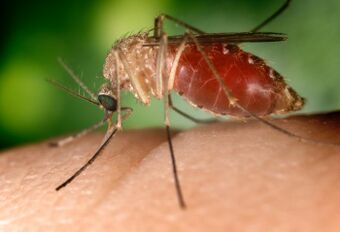Medicine:Skeeter syndrome
| Skeeter syndrome | |
|---|---|
 | |
| Culex mosquito on a human finger | |
| Symptoms | Redness, heat, abnormal swelling surrounding bite site, pus, pain at the site |
Skeeter syndrome (papular urticaria) is a localized severe allergic reaction to mosquito bites,[1] consisting of inflammation, peeling skin, blistering, ulceration and sometimes fever. It is caused by allergenic polypeptides in mosquito saliva, and therefore is not contagious.[2] It is one of several forms, being one of the most severe, of allergic responses to mosquito bites, termed mosquito bite allergies.[3]
The condition may vary between individuals based on the reaction size and severity. Some individuals may experience reactions only to some bites and not others, thought to be attributed to varying reactions to different species of mosquitoes.
Although the term seems informal, it has appeared in scientific literature.[4]
Diagnosis
Clinical examination alone cannot distinguish between a response caused by infection, such as cellulitis, and skeeter syndrome. However, skeeter syndrome usually progresses over the course of hours versus cellulitis, which typically evolves over the course of several days. As such, accurate history is imperative when making the diagnosis. Since IgE and IgG are key players in mosquito allergy, diagnosis can be confirmed by an immunosorbent assay measuring IgE and IgG to mosquito saliva antigens.[citation needed]
Differential diagnosis
The Skeeter syndrome should not be confused with another type of reactivity to mosquito bites, severe mosquito bite allergy (SMBA). SMBA is most often an Epstein-Barr virus-associated lymphoproliferative disease that complicates ~33% of individuals with chronic active Epstein-Barr virus infection or, in extremely rare cases, individuals with Epstein-Barr virus-positive Hodgkin disease or an Epstein-Barr virus-negative lymphoid disease such as chronic lymphocytic leukemia and mantle cell lymphoma.[5] It is a hypersensitivity reaction characterized by the rapid development of skin redness, swelling, ulcers, necrosis and scarring following mosquito bites. The reaction is often accompanied by relatively severe systemic symptoms such as fever and malaise;[6] enlarged lymph nodes, liver, and/or spleen; liver dysfunction; hematuria; and proteinuria.[5]
Treatment
Taking oral cetirizine regularly has been known to help those who suffer from skeeter syndrome.[citation needed] In addition to oral steroids, topical steroids and other anti-itch creams can ease the reaction.
References
- ↑ "'Skeeter Syndrome' Describes Local Allergic Reactions to Mosquito Bites". AllergyWatch (The American College of Allergy, Asthma & Immunology) 2 (1). 2000. http://paperzz.com/doc/1150592/vol.-2--no.-1---american-college-of-allergy--asthma-and-i.... Retrieved 2012-05-18.
- ↑ Isawa, Haruhiko; Yuda, Masao; Orito, Yuki; Chinzei, Yasuo (2002). "A mosquito salivary protein inhibits activation of the plasma contact system by binding to factor XII and high molecular weight kininogen". Journal of Biological Chemistry 277 (31): 27651–8. doi:10.1074/jbc.M203505200. PMID 12011093.
- ↑ "[Hypersensitivity to mosquito bite manifested as Skeeter síndrome]" (in es). Revista Alergia Mexico 62 (1): 83–7. 2015. PMID 25758116.
- ↑ Simons, F.Estelle R.; Peng, Zhikang (1999). "Skeeter syndrome". Journal of Allergy and Clinical Immunology 104 (3): 705–7. doi:10.1016/S0091-6749(99)70348-9. PMID 10482852.
- ↑ 5.0 5.1 "Primary EBV infection and hypersensitivity to mosquito bites: a case report". Virologica Sinica 31 (6): 517–520. December 2016. doi:10.1007/s12250-016-3868-4. PMID 27900557.
- ↑ "Epstein-Barr virus (EBV)-associated lymphoid proliferations, a 2018 update". Human Pathology 79: 18–41. September 2018. doi:10.1016/j.humpath.2018.05.020. PMID 29885408.
External links
| Classification |
|---|
 |


